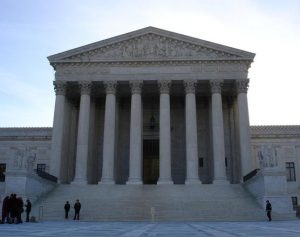 This week the Supreme Court, in United States v. Jones, ___ US ___ (2012), decided that placing a GPS on a person’s car and tracking to movements is a search that requires a warrant. This is an important decision for several reasons. First, changes in modern technology make it easier for government to intrude on our privacy. Second, it made it clear that there are two ways to analyze when a search warrant is needed. Third, it shows that the Court may change its views of the Fourth Amendment as technology becomes more invasive of our privacy.
This week the Supreme Court, in United States v. Jones, ___ US ___ (2012), decided that placing a GPS on a person’s car and tracking to movements is a search that requires a warrant. This is an important decision for several reasons. First, changes in modern technology make it easier for government to intrude on our privacy. Second, it made it clear that there are two ways to analyze when a search warrant is needed. Third, it shows that the Court may change its views of the Fourth Amendment as technology becomes more invasive of our privacy.
The facts were that Mr. Jones was suspected of drug dealing. Drug agents got a warrant to place a GPS on his car by a certain date in Washington, DC. They did not put the GPS on the car as specified in the warrant. Instead, they found the car in Maryland and put the GPS on the car after the warrant date. They tracked every move his car made for four weeks. Using the GPS information agents found evidence that arguably tied Jones to drugs and money. They charged him in a drug trafficking conspiracy.
Jones moved to suppress the evidence (prohibit the government from using it at trial.) He argued that placing the GPS on his car was a search, and that the search was illegal without a warrant.
The judge in the trial court held that GPS evidence when the car was parked in Jones’ garage was private and suppressed it. All other evidence, however, including the evidence tying him to drugs and money, was admitted. The judge’s theory was that Jones had a “reasonable expectation of privacy” in his home, but not in his public movements.
Jones went to trial. In the first trial there was a hung jury. The government tried him again. He was convicted. He appealed and the Circuit Court of Appeals reversed, holding that the GPS evidence was illegally obtained. The government appealed to the Supreme Court.
Although the Supreme Court was unanimous in upholding the Court of Appeals and ruling the GPS attachment was illegal under the Fourth Amendment, they disagreed about why.
In the main decision four of the nine judges looked back to the time the Constitution was written. At that time placing something in a person’s property (such as a wagon) could be the grounds for a lawsuit called trespass to chattels. They held that this was the same sort of trespass. They did not go so far as to say a warrant was required in every case a GPS was placed on a vehicle, because the government waived that argument.
This “trespass to property” view of the Fourth Amendment was popular with the courts up until 1967 when the case of Katz v. United States, 389 US 347 was decided. Katz was in a phone booth that he always used. Government agents bugged the booth to record his phone calls. Under the trespass view of the Fourth Amendment Katz could not argue that he owned the phone booth and, therefore, he could not claim the government trespassed when the planted the bug. The Supreme Court ruled that he did not need a property interest to have Fourth Amendment protection because he had a “reasonable expectation of privacy” in the phone booth.
Following Katz many courts used the ‘reasonable expectation of privacy” standard exclusively, and ignored the old trespass standard. In Jones the Court made it clear that both property rights and expectations of privacy are grounds for protection under the Fourth Amendment.
Four other judges held that the trespass approach was wrong in this case, and that putting it on the car was not a search. However, they appear to say that a GPS that monitors your every move for a month is so invasive it violates your reasonable expectation of privacy under the Fourth Amendment. This part of the opinion is important because it shows that the Court recognizes the privacy problems that modern technology poses when it is used to investigate people. Unfortunately, it is not very clear on how the judges would handle cases as a rule.
So far, the Court agreed that the the use of the GPS was illegal in this case, but they could not agree why. The final justice (Sotomayor) filed a concurring opinion that agreed with the property-trespass view, but also appeared to agree that a reasonable expectation of privacy was violated because of the length of the search. She specifically noted that a long-term GPS record could show whether people went to church, an HIV clinic, spent late nights at a bar or with a mistress. This is a serious intrusion into people’s lives.
The opinion leaves at least two important questions open.
1. Does the government need a warrant to put a GPS on your car?
2. If the GPS only stays on for a short time, is your privacy violated?
Time will likely give us the answers to these questions.
 Southern Maine Criminal Lawyer Blog
Southern Maine Criminal Lawyer Blog